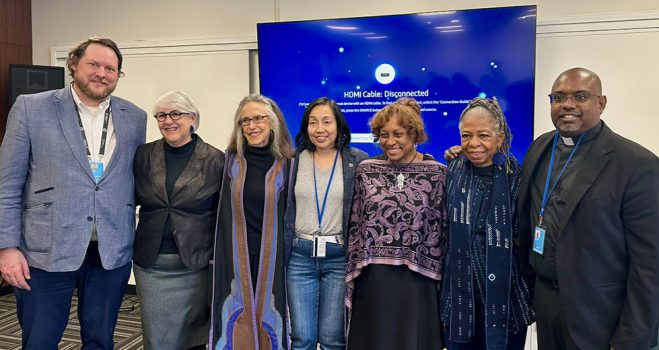A panel discussion, “Zacchaeus Tax: Transforming the Global Economic System and Advancing Gender Justice,” on 19 March explored the intersections between tax justice and gender justice—and why this is a matter of faith.
The event was held parallel with the 68th Session of the Commission on the Status of Women, which has the theme “Accelerating the achievement of gender equality and the empowerment of all women and girls by addressing poverty and strengthening institutions and financing with a gender perspective.”
The panel explored how proposals for global and national wealth and taxes, as well as reparations—as called for in the ecumenical Zacchaeus Tax (ZacTax) campaign—can help build a more just and sustainable planet including for women and girls.
The ZacTax Campaign, part of the New International Financial and Economic Architecture (NIFEA) advocacy platform, is named for Zacchaeus to deliver equity and make reparation for exploitation and injustice.
Dora Arce Valentin, general secretary of the Reformed-Presbyterian Church in Cuba and executive secretary of AIPRAL, the WCRC’s Latin American regional council, discussed why carbon and pollution taxes are a matter of ecological and gender justice.
“How can tax justice contribute to climate and ecological reparations?” she asked. “Caring for ecosystems, and thus the relationships between individuals, societies, and the rest of creation, is a fundamental aspect of our humanity as economos (stewards).”
World Council of Churches president from North America Angelique Walker-Smith, who serves as strategist for Pan-African and Orthodox Faith Engagement, Bread for the World, and National Council of Churches of Christ in the USA governing board member, spoke about why churches should care about the global tax system.
“Can tax justice advance gender equity?” she asked, noting that the transformative evidence of our faith and biblical testimonies illustrates where taxation did and could have made the difference for all to live a more equitable life. “Shockingly, 252 of some of the richest men possess more wealth than 1 billion women and girls in Africa, Latin America, and the Caribbean combined! Taxing the richest ensures that wealth that is created by workers and subsidized by unpaid women’s work is redistributed, helping at the same time to rebuild trust in democratic institutions and systems that respect and protect women’s rights.”
For Cynthia Moe-Lobeda, Professor of Theological and Social Ethics at Church Divinity School of the Pacific, wealth taxation—as a tool for building economic and gender equity—is at the heart of religious faith.
“Wealth tax is a tool of neighbor love. The ZacTax brings home, makes concrete, just how ordinary people may engage in the sacred movement to build gender equity and to abolish poverty through just taxation,” she said.
Iva Carruthers, general secretary of the Samuel DeWitt Proctor Conference, explored tax justice and reparations.
“If you want to improve the wellbeing of a community, improve the wellbeing of its women,” she said. “To the extent that women of faith believe in the imago dei, have an affinity of shared interests with other women across barriers of race, ethnicity, religion, geography, language…then women and men of faith will have to confront the challenge of being at the crossroads when the worst fears of Afro-phobia are manifested by a changing world in which people of color are demographically transforming the world and the instrument of reproduction are women; women of color producing children of color.”
The Commission on the Status of Women zero draft outcome document—which contributes to
the zero draft of the “Pact for the Future,” the envisaged outcome of the UN Summit for the
Future—calls on states to “strengthen international tax cooperation to be more inclusive and
effective, with a focus on combatting tax evasion and avoidance and curbing illicit financial
flows and directing resources to end women’s poverty.”
It also calls for “ensuring the progressivity of tax policies with a focus on taxing those with the
highest ability to pay, including via wealth and corporate taxation, and preventing regressive
taxation that disproportionately impacts women and girls with low or no incomes.”
The event was co-organized by the World Council of Churches, World Communion of Reformed Churches, Lutheran World Federation, World Methodist Council, and Council for World Mission as part of the NIFEA initiative.
The economic justice work of the WCRC is funded by the Council for World Mission, Otto per Mille, and other partners and members.
Article courtesy of the World Council of Churches. Image: Rebekka Read/WCC.


